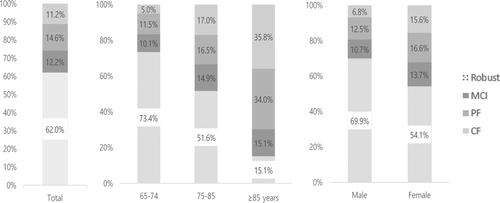Prevalence and associated factors of cognitive frailty in community-dwelling older adults: Results from the Korean longitudinal study of aging
Abstract
Background
Cognitive frailty, a condition characterized by physical frailty with cognitive impairment, is emerging as a determinant of adverse health outcomes in older adults. However, its prevalence and correlation with associated factors are unknown in the aging population of Korea.
Objectives
To estimate the prevalence of cognitive frailty and identify factors associated with it among older Korean adults.
Methods
A secondary analysis was performed using the Korean Longitudinal Study of Aging seventh survey dataset collected in 2018. Multinomial logistic regression analyses were conducted to examine the association between cognitive frailty and demographic, psychosocial, oral health and physical function factors. Individuals aged ≥65 years and without dementia were included (N = 1024). Participants were classified into four groups based on the presence or absence of physical frailty and mild cognitive impairment. This article is executed in accordance with the Strengthening the Reporting of Observational Studies in Epidemiology (STROBE) statement.
Results
The prevalence of cognitive frailty in the study sample was 11.2%. The results of multinomial logistic regression showed that advanced age, being female, lower education levels, heart disease, arthritis or rheumatoid arthritis, underweight, depression, non-social activity, poor oral health and functional limitation were significantly associated with cognitive frailty.
Conclusions
Cognitive frailty is prevalent among community-dwelling older adults in Korea. The findings provide primary care providers with insights about effective strategies for identifying at-risk individuals and will guide the development of population-level interventions to prevent or delay the onset of physical frailty and cognitive impairment in older adults.
Implications for practice
The findings provide practical information to healthcare providers for identifying cognitive frailty in older adults. The risk factors of cognitive frailty, such as psychosocial, oral health, and physical function factors, should be thoroughly monitored for older adults. Health personnel working in primary care have a critical role in identifying risk and beneficial factors and promoting preventative strategies that enhance health outcomes.


 求助内容:
求助内容: 应助结果提醒方式:
应助结果提醒方式:


